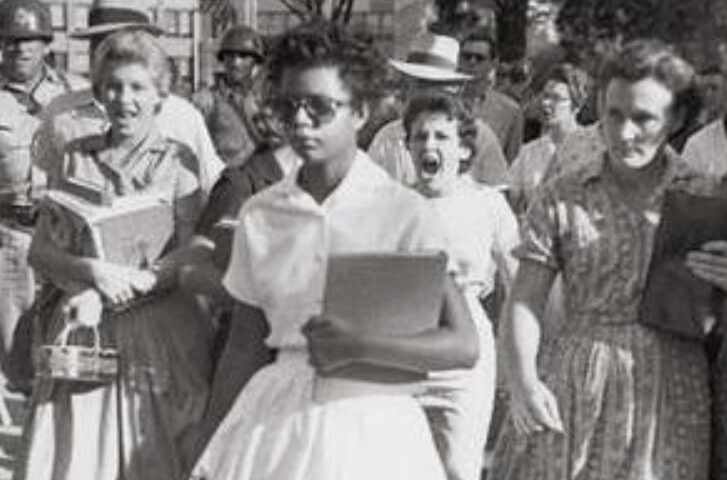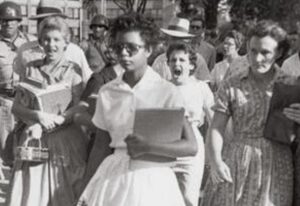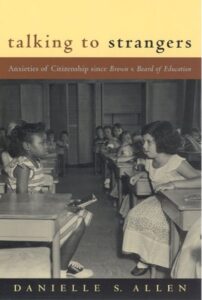The BEST: Talking to Strangers

 Summary: In her Talking to Strangers: Anxieties of Citizenship Since Brown v. Board of Education (University of Chicago, 2004), political scientist Danielle S. Allen champions “a citizenship of political friendship” as an ever-necessary but always-elusive ideal of democratic life. Allen dilates on the example of Elizabeth Eckford, whose attempt to enter a hitherto white-only school in Little Rock was memorialized in an iconic photograph, as a model for our responsibilities as democratic citizens in this regard. Following Brown v. Board of Education, the law said that schools ought to be integrated. Actual integration, however, presupposed a kind of accountability between citizens that the reality of interpersonal relations in America was not prepared for. In the photo, Eckford is seen attempting to adjust this reality through the manifest acceptance of risk and sacrifice in pursuit of mutual goodwill. In making herself vulnerable to the mob, with calmness and dignity, so that she could attend school with the children of those who would do her harm, she put forward to all who saw her an invitation to wholeness. This represented, Allen says, nothing short of a new constitution for America. But the work remains unfinished.
Summary: In her Talking to Strangers: Anxieties of Citizenship Since Brown v. Board of Education (University of Chicago, 2004), political scientist Danielle S. Allen champions “a citizenship of political friendship” as an ever-necessary but always-elusive ideal of democratic life. Allen dilates on the example of Elizabeth Eckford, whose attempt to enter a hitherto white-only school in Little Rock was memorialized in an iconic photograph, as a model for our responsibilities as democratic citizens in this regard. Following Brown v. Board of Education, the law said that schools ought to be integrated. Actual integration, however, presupposed a kind of accountability between citizens that the reality of interpersonal relations in America was not prepared for. In the photo, Eckford is seen attempting to adjust this reality through the manifest acceptance of risk and sacrifice in pursuit of mutual goodwill. In making herself vulnerable to the mob, with calmness and dignity, so that she could attend school with the children of those who would do her harm, she put forward to all who saw her an invitation to wholeness. This represented, Allen says, nothing short of a new constitution for America. But the work remains unfinished.
Why this is The BEST: We all find ourselves sharing communities (think neighborhoods, nations, the world, school boards) with others with whom we disagree deeply on how things ought to be. It is tempting, to impose our own view on those others. We may use violence, or, if we are more civilized, strategically manipulate others’ minds and wills. The latter method is dominant in contemporary politics and life, where well-paid operatives can get the results their clients want.
 It is also tempting to seek unanimity, whether through effective, empathy-driven persuasion or through ambitiously devised, mutually-satisfactory compromise. And lastly, it is tempting to retreat to a standpoint of neutrality abstracted from particular positions and to adjudicate from there. Agreement can be reached across difference if we can negate our differences. These approaches are characteristic of prevailing liberal-academic orthodoxy.
It is also tempting to seek unanimity, whether through effective, empathy-driven persuasion or through ambitiously devised, mutually-satisfactory compromise. And lastly, it is tempting to retreat to a standpoint of neutrality abstracted from particular positions and to adjudicate from there. Agreement can be reached across difference if we can negate our differences. These approaches are characteristic of prevailing liberal-academic orthodoxy.
Danielle Allen’s Talking to Strangers reaches to expand our sense of possibility beyond this menu and calls us to greater responsibility. For Allen, the fundamental problem in each of the approaches I’ve sketched is that they respond to conflict by seeking oneness rather than wholeness, whereas “Wholeness, not oneness, is the master term in the history of the production of democratic peoples” (17). The ideal of oneness put forward in the pledge of allegiance, Allen argues, was intentionally woven into American consciousness precisely to hide the reality that we were, in fact, not one. There was a dominant group and a subordinate, oppressed group, and it was in the interests of the powerful to keep things that way. This requires that the problem not be seen. Wherever the reality of our brokenness threatens to become apparent, we are told that we must be one. It cannot be, and we must not say, that we are broken. The ideal of wholeness turns this around: because the reality is that we are not one, we must do what it takes to become whole. “A speaker,” she says, “cannot use the word ‘one’ to mean multiplicity, but the word ‘whole’ entails just that” (17).
What wholeness requires for Allen is a kind of political friendship. This is not a popular notion in our culture, but she pleads with us to see that “When political scientists, economists, and politicians argue that, if every citizen simply pursues her own self-interest without reservation, the common good will result, they make a sad mistake. No consensually based form of social organization can, over the long term, sustain relationships of cooperation in the face of unrestrained self-interest” (137). We are interdependent and our fates are intertwined, and so we must not only interact atomically but cooperate communally.
Friendship in turn requires trust, and trust requires the manifest willingness for sacrifice. You need to know that I will, some of the time and to some extent, honor your interests at the expense of my own. And you can know that only if I in fact do so. There are no shortcuts. If my interests always win out, then no matter how justified and righteous I might appear in each case, I am clearly no friend. Our arrangement must be such that over time our respective wins and losses even out.
If, however, in a given case I must ask you to sacrifice for the greater good, then you must be equipped with “criteria for differentiating reasonable from unreasonable feelings of loss” (46) – and the opportunity to voice your concern when you have been asked to sacrifice too much. Because this labor will always remain incomplete, “Democratic citizenship must involve practices not only for assessing whether a given experience is reasonably identified as a loss and whether that sacrifice is reasonably requested but also for responding even to those emotions that remain after the criteria of reasonableness have done their work” (47). Practically, how can we go about the work of remaining whole, when we are not one?
Allen’s book operates in the realm of high theory and grand history, but it is addressed to individual citizens in their everyday lives. Each of us can, and so must, contribute to our country’s fund of goodwill and mutuality. We do this not through professing the right views, and not through politeness around charged topics, but through talking to strangers, which for Allen means leaving our comfort zones to form actual relationships of cooperation and accountability with those we’d prefer stay at a distance. It means giving real power to those persons who do not belong to our groups but whom our groups’ power affects.
This has critical import for our national-political lives, but it is, I think, no less important within the smaller frames of our communities, families, and relationships. Where there are things of importance at stake, there will always be conflict, and so we will always owe it to each other to make real our accountability to each other. We owe each other not merely ahdut, but the shalom that can only come from sheleimut.
Alex S. Ozar serves as a rabbi with OU-JLIC and the Slifka Center for Jewish Life at Yale University, where he recently completed a Ph.D. in philosophy and religious studies. Click here to read about “The BEST” and to see the index of all columns in this series.
